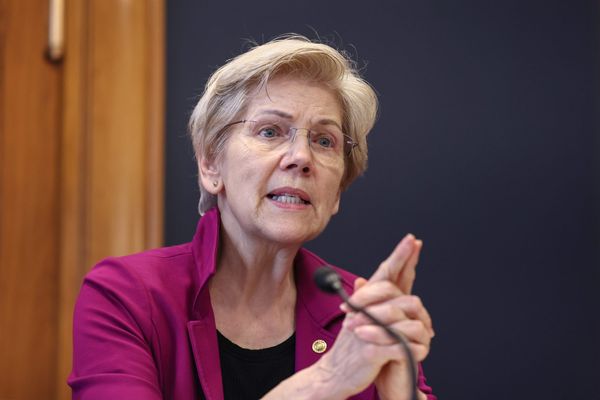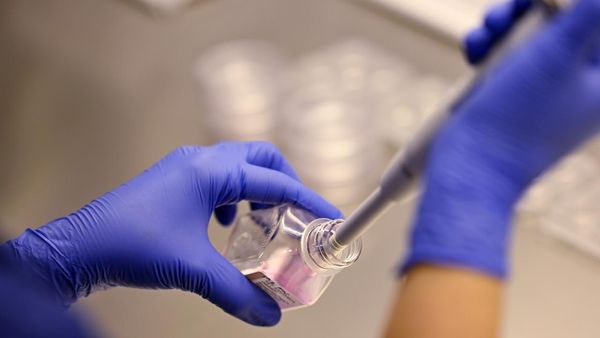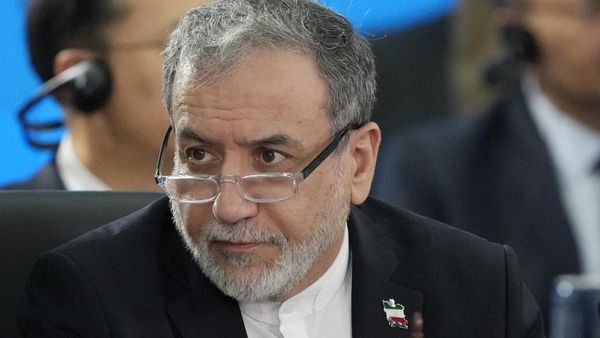
Donald Trump has sued Rupert Murdoch and two Wall Street Journal newspaper reporters for libel and slander over claims that he sent the sex offender Jeffrey Epstein a lewd letter and sketch of a naked woman.
Trump’s lawsuit on Friday, which also targets Dow Jones and News Corp, was filed in the southern district of Florida federal court in Miami.
The lawsuit seeks at least $10bn in damages.
It came after the Journal reported on a 50th birthday greeting that Trump allegedly sent to Epstein in 2003 that included a sexually suggestive drawing and reference to secrets they shared.
It was reportedly a contribution to a birthday album compiled by Ghislaine Maxwell, who is serving a 20-year sentence in Florida after being found guilty of sex-trafficking and other charges in 2021.
“A pair of small arcs denotes the woman’s breasts, and the future president’s signature is a squiggly ‘Donald’ below her waist, mimicking pubic hair,” the Journal reported of the alleged drawing. The letter allegedly concluded: “Happy Birthday – and may every day be another wonderful secret.”
Trump vehemently denied the Journal report and claimed the letter was fake. He said on Truth Social that he warned Murdoch, the founder of News Corp, the newspaper’s parent company, that he planned to sue.
The president posted: “Mr Murdoch stated that he would take care of it but obviously did not have the power to do so. Instead they are going with a false, malicious, defamatory story anyway. President Trump will be suing the Wall Street Journal, News Corp and Mr Murdoch shortly.”
Vice-President JD Vance poured scorn on the report, tweeting on Thursday: “Forgive my language but this story is complete and utter bullshit. The WSJ should be ashamed for publishing it. Where is this letter? Would you be shocked to learn they never showed it to us before publishing it? Does anyone honestly believe this sounds like Donald Trump?”
The lawsuit is the first that Trump has filed against a media company while in office. But he launched numerous legal actions before returning to the White House, raising fears of a chilling effect on free speech. Most ended in defeat but over the past year he has won more than $30m in settlements from legal actions against ABC News and Paramount.
In a post on his Truth Social site, Trump cast the lawsuit as part of his effort to punish media outlets, including ABC and CBS, which both reached multimillion-dollar settlement deals with the president after he took them to court.
“This lawsuit is filed not only on behalf of your favorite President, ME, but also in order to continue standing up for ALL Americans who will no longer tolerate the abusive wrongdoings of the Fake News Media,” he wrote.
But advocates for press freedom cast doubt on the merits of the case.
Professor Roy Gutterman, director of the Tully Center for Free Speech at Syracuse University in Syracuse, New York, said: “This defamation case was filed only a day after this explosive story was published, and this speed might actually reflect that. The complaint is heavy on arguments about the story’s reach and how quickly it went viral and was reposted on social media.”
He added: “Asking for $10bn for each count almost sounds comical, and is certainly not related to any plausible damages a plaintiff might have suffered if the story turns out to be false. But the plaintiff [Trump] is going to have to prove that the Wall Street Journal published this story knowing it was false, which does not seem plausible, either.
“We are talking about one of the most highly respected news outlets in the country, if not the world. The reporters and editors, and I’m sure their lawyers, had no reason to doubt the veracity of what they published.”
The case also marked another chapter in the chequered relationship between Trump and Murdoch, whose Fox News network champions the president and has supplied some of his staff. The pair have shared roots in New York’s tabloid culture and recently realigned. In February Trump hosted Murdoch in the Oval Office, praising him as “legendary” and “an amazing guy”.
The president has faced an extraordinary backlash from his own supporters over his refusal to release files about Epstein. A Reuters/Ipsos poll this week found that 69% of respondents thought the federal government was hiding details about Epstein’s clients, compared with 6% who disagreed and about one in four who said they unsure.
The best public interest journalism relies on first-hand accounts from people in the know.
If you have something to share on this subject you can contact us confidentially using the following methods.
Secure Messaging in the Guardian app
The Guardian app has a tool to send tips about stories. Messages are end to end encrypted and concealed within the routine activity that every Guardian mobile app performs. This prevents an observer from knowing that you are communicating with us at all, let alone what is being said.
If you don't already have the Guardian app, download it (iOS/Android) and go to the menu. Select ‘Secure Messaging’.
SecureDrop, instant messengers, email, telephone and post
See our guide at theguardian.com/tips for alternative methods and the pros and cons of each.
On Friday, in another effort to dampen the outrage about an alleged government cover-up, Trump ordered his attorney general, Pam Bondi, to seek the unsealing of grand jury testimony from the prosecution against the disgraced financier.
In a filing in New York, Bondi cited “extensive public interest” for the unusual request to release what is typically secret testimony.
Trump said earlier his Truth Social platform that he had authorised the justice department to seek the public release of the materials, which are under seal, citing “the ridiculous amount of publicity given to Jeffrey Epstein”.
He did not say he had authorised the release of files on Epstein held by the justice department and the FBI.
Epstein, a longtime friend of Trump and multiple high-profile men, was found hanging dead in a New York prison cell while awaiting trial on charges that he sexually exploited dozens of underage girls at his homes in New York and Florida.
The case sparked conspiracy theories, especially among Trump’s far-right voters, about an alleged international cabal of wealthy pedophiles. Epstein’s death – declared a suicide – before he could face trial, accelerated the narrative.
When Trump returned to power for a second term this January, his supporters clamored for revelations about Epstein’s supposed list of clients. But Bondi issued an official memo this month declaring there was no such list.







